
[ad_1]
As the autumn ordeal has gone on, a new take on England’s plight has begun to form. Maybe this is just their ceiling. Maybe they are not a global force any more. In fact, in truth, they rarely have been.
Put aside a few imperious years under Sir Clive Woodward and a super-spike or two under Eddie Jones and the rest of more than two decades since the solitary World Cup triumph looks mediocre. So, an alternative version of the current slump is that Steve Borthwick is merely trying in vain to prevent England from reverting to their regular, mid-table status.
Rugby statistician Russ Petty (who is well worth a follow on social media) posted illuminating data on Sunday. It showed that in the last 20 years, England have played 84 Tests against teams ranked in the top four of the global rankings at that time. Their tally has been 23 wins, two draws and a whopping 59 defeats.
In the Six Nations era, France and Wales have won four Grand Slams each, Ireland have won three and England have won two. Since Woodward’s legendary side brought the Webb Ellis Cup home from Australia in 2003, Ireland and Wales have each claimed six championship titles, France have won five and England have won four.
Where or what is their world-leading trump card? France has the best league and a vast supply of monsters and magicians in a country obsessed with the game. New Zealand and South Africa have champion pedigree and freakish genetics, along with an engrained oval-ball culture. Ireland have a well-oiled system which wrings every drop out of their potential.
What about England? They have the most money; a big stadium, a big budget and a big fan base. So, there are elements of English’s rugby infrastructure which create a false impression of grand status. But clubs have gone bust, several players have moved abroad and coaches struggle to maximise talent, seemingly constrained by so many different mental barriers.
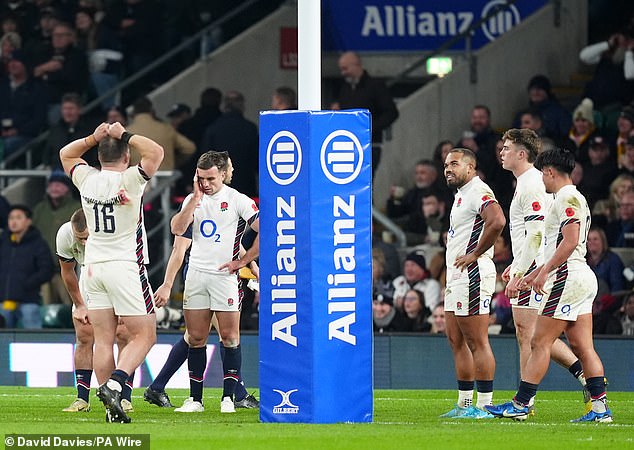
England have lost five Test matches in a row after Saturday’s 29-20 defeat by South Africa
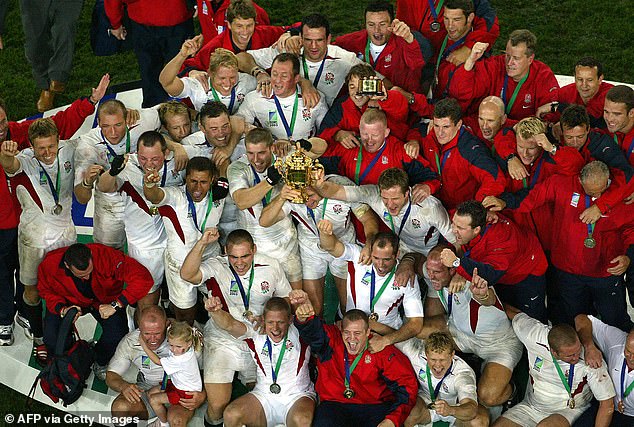
It has been more than 20 years since England won their only Rugby World Cup title in 2003

Without the imported likes of Manu Tuilagi and the Vunipolas, England don’t have super-specimens at their disposal. Woodward’s era had ground-breaking innovation and a once-in-a-generation gathering of supreme leaders. At that time, there were always several Englishmen worthy of a place in any World XV. Now? Probably none.
Perhaps this is just their level, featuring occasional, one-off peaks and landmark results before dropping back into the midst of the peloton, chasing the distant leaders. England don’t have the look of title-winners and world-beaters-in-waiting. What evidence even hints at that?
Next up, Japan, who are not what England need right now. That series finale next Sunday is a home banker which will prove nothing and can’t ease the pain, even if the hosts run riot, as they surely will. But at least a win, however hollow, will stop the run of five consecutive defeats – and six in the last seven Tests. High-pitched shrieks of delight will reveal the presence of a very different crowd, just happy for the rare chance to be there and enjoy the show, without a care about the context.
England expects? Well, maybe not so much any more. There was no booing after this latest loss; no discernible angst. Drunken fans danced outside. Pictures were taken. The logos shone brightly and nothing could stop the relentless stockpiling of heavily branded matchday profit. It’s as if the shiny commercial juggernaut isn’t knocked off course, whatever the result.
But in the midst of it all, there is a team which is a long way off course, while still manfully pushing the party line that all is well, the results will come. When exactly? After the non-event cruise past Japan, England will disperse and stew over Christmas and New Year, before reconvening for the Six Nations, but that is unlikely to bring much welcome respite.
The championship opener is in Dublin, against Ireland, who were beaten by a point at Twickenham back in March, when the English stars aligned for once. They will be without their head coach – as Andy Farrell will be in Lions mode – but they won’t be without a truck-load of motivation to settle a score. That will be a daunting first assignment in 2025.
Then France come to London. France who just beat the All Blacks in Paris. France who have Antoine Dupont – an icon who walks into everyone’s World XV. And France who amassed a record-breaking 53 points against England two years ago, to turn Le Crunch into Le Crash for the shattered hosts.
Back to the present, Borthwick and his squad will regroup this week and seek consolation in their claims of positive progress. But such rhetoric appears as hollow as the next fixture.
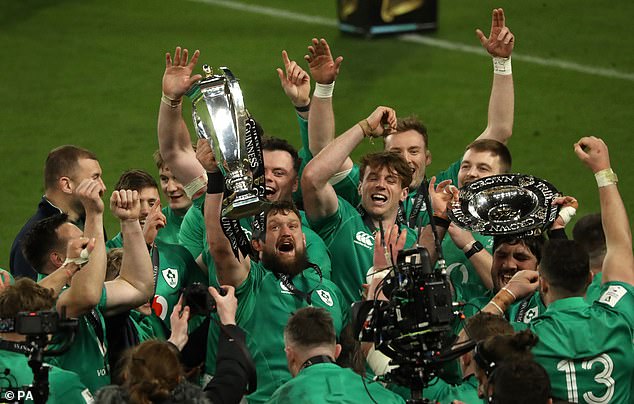
Ireland, Wales and France have all won more Six Nations titles than England since 2003
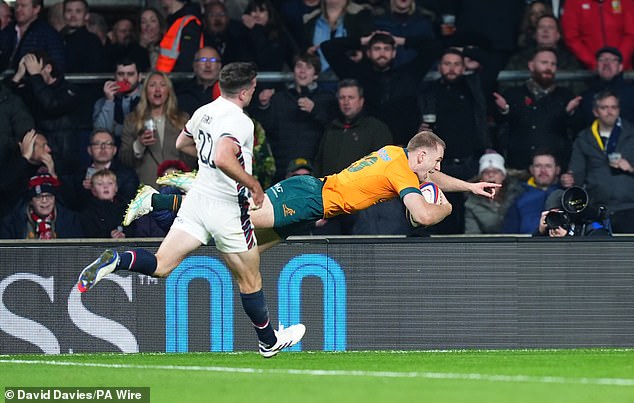
England led 7-0 and 10-7 but South Africa ran out 29-20 winners at Twickenham on Saturday
This month, they have lost by two points, lost by five and lost by nine – in that order. They have gone from fifth in the world rankings to seventh, with a drop to eighth potentially imminent. This year’s final return will be played 12, won five.
England had created a hyper-aggressive defence to trouble the best, before retreating into a state of defensive disarray to trouble no-one. Tactical clarity has given way to confusion. Progress?
Fixing problems will be tricky, out of camp. Borthwick could summon reinforcements and revamp his side, but he’s not exactly overlooking a raft of superstars capable of igniting a rapid revival. He needs Ollie Chessum fit again and could promote Tom Willis as a No 8 offering raw gainline clout, but there aren’t too many other obvious upgrade options.
Ideally, England would spend the next two months locked away together ironing out defensive and disciplinary flaws, but that’s not how it works. Players will be back on club duty and having been recruited to take over from Felix Jones – who is working his notice period remotely – Joe El-Abd has to park his frustrations and go back to his day job in charge of French club Oyonnax; an arrangement which will go on until the end of this season.
Aside from some brief catch-ups, England will reconvene in late January, head to northern Spain for warm-weather training and try to problem-solve in a hurry. Then, if they lose to the Irish, there will be the usual talk about limited preparation time.
The national team are stuck in a vicious cycle; playing the same movie and the same soundtrack to the same despondent audience. Apparently, all the near-misses will become a launchpad for future prosperity, but that has become a familiar, tired party line.
In truth, this one wasn’t really such a near-miss anyway. It had been the ‘width of a post’ against New Zealand (these posts must be wider than we realise) and it had been one re-start fumble away from a win against Australia – which overlooks that England contrived to throw that game away two or three times. But in this third Test of the Autumn Nations Series, the visitors prevailed despite being a long, long way below their vintage best.
The Springboks barely bothered to celebrate at the end, as they knew they had been scrappy and unconvincing by their exalted standards. But when it mattered, they found the flair and the fight to take the spoils. Rassie Erasmus’s side fell back on the quick-step brilliance of Grant Williams and Cheslin Kolbe, and the thunderous impact of their giant locks, Eben Etzebeth and RG Snyman. And in the final quarter, they held the line and repelled England’s untidy rear-guard action.
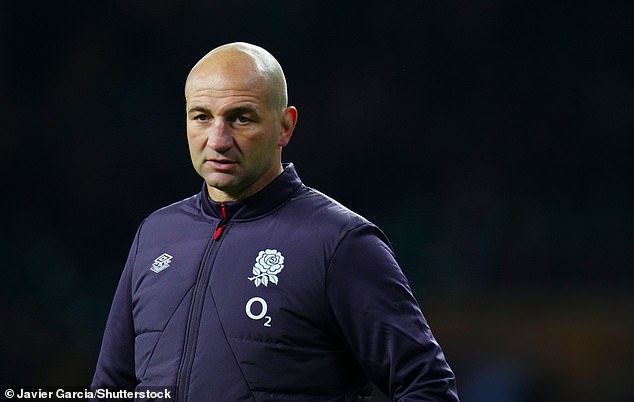
Coach Steve Borthwick must now rouse his England players for a home game against Japan
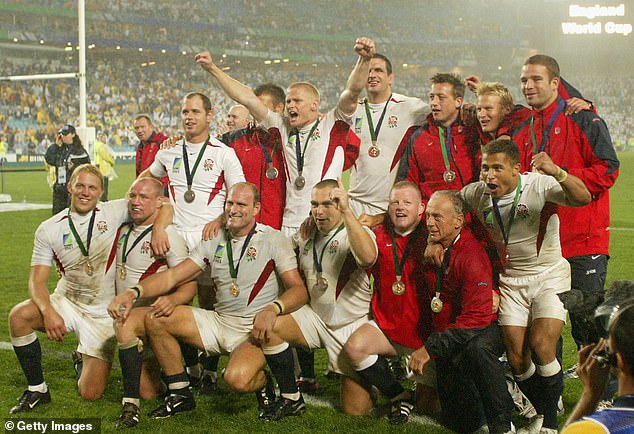
But Borthwick’s squad is nowhere near as talented as Sir Clive Woodward’s class of 2003 was
England had a mountain of promising possession in the closing stages and they wasted it. They went for the corners and for the jugular from attacking penalties, but the ploy didn’t pay off. Their lineout unravelled and they were routed at the breakdown. South Africa were the ones who had the ‘dog’ in them for a last-quarter tussle and they also had the jackals to rule the rucks and stem the tide.
Borthwick has been backed by his bosses to put this right. The RFU hierarchy are adamant that the results have been sub-standard, but that they have the right regime in place to oversee a profound transformation. That is a glass-half-full outlook which appears to be based on hope rather than rational expectation.
There is an increasing, nagging sense that this is England; competitive against the best when the force is with them, but no longer a super-power of the sport, capable of sustained success.
England ‘A’ impressive in win over Australia
England’s ‘A’ team provides a useful bridge between club and Test rugby, and a host of wannabes will have caught Borthwick’s eye on Sunday as the national second-string side beat their Australian counterparts 38-17 at The Stoop.
It was a shame that there were so many empty seats, no doubt due to high ticket prices, but those present were treated to some classy creativity from the hosts. One long-range try in the first half showed a glimpse of what English players can do when the handbrake is off – and when they have Bath visionary Lee Blackett organising the attack.
Joe Carpenter’s high-ball take and rapid off-load set the wheels in motion, then Gabriel Ibitoye combined with Henry Pollock before carrying at pace, one-handed, into the visitors’ 22. When the Bristol flier was brought down, Will Porter spun clear of a ruck and flung a long pass for Curtis Langdon to crash over. It was box-office brilliance and a welcome boost after events across the A316 the day before.
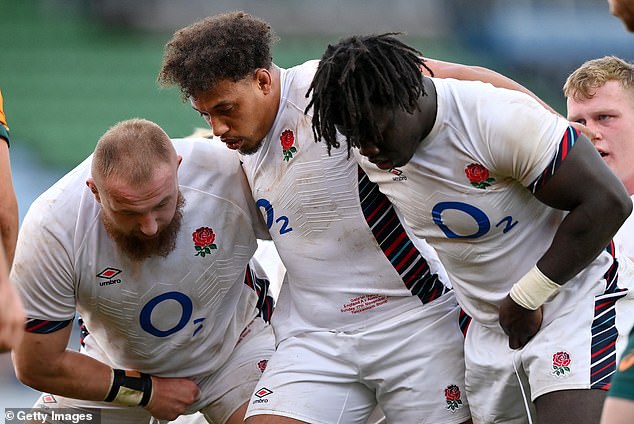
England ‘A’ beat Australia 38-17 to end a disappointing weekend for English rugby on a high
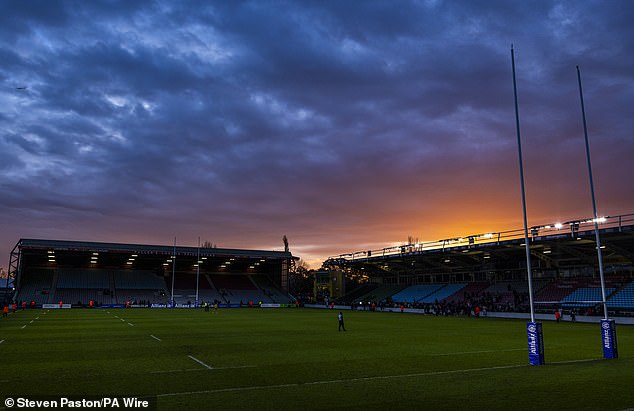
Sunday’s game took place in front of plenty of empty seats at The Stoop in south-west London
Rugby needs to dazzle before games as well as during them
There was an eye-catching light show at Twickenham before kick-off on Saturday, but within hours it had been eclipsed by the spotlight focus on the opposing teams lining up for the Haka at the Stade de France. The French have turned these laser-and-light productions into a calling card in recent years and Wales mastered the concept before that, with their dragon fire imagery. All of it helps to create a sense of occasion. Rugby needs to dazzle before games as well as during them. Night fixtures can create logistical hassle, especially for travelling fans, but they don’t half work when it comes to delivering these theatrical flourishes.
Last Word
Come on Brett Robinson, surprise us; actually change the game for the better, as was swiftly promised. When the Australian edged out ex-France captain Abdelatif Benazzi to become World Rugby’s new chairman, it was perceived as a victory for the cosy status quo.
Here’s hoping the former Wallaby can alter that reasonable perception, by pushing for vital governance reform and spreading the game’s power base. Brett, be bold and open up new frontiers – starting with Georgia and Spain. The Georgians are more deserving of a place in the new Nations Championship than struggling Japan and on Sunday they so nearly upset Italy in Genoa.
After a close encounter which demonstrated yet again that Georgia full back Davit Niniashvili is a supreme, electric talent, Richard Cockerill urged the authorities to aid his team’s development. ‘It’s about playing at this level and understanding what it takes,’ said the former England hooker.
‘Georgian rugby is massive; it’s only getting bigger. We just want an opportunity from World Rugby to get into a competition where we can improve and play fixtures like this on a regular basis.’
Meanwhile, Spain gave Fiji a scare in front of a big crowd in Valladolid, before the Pacific islanders fought back from a 19-7 deficit to snatch a 33-19 win. But the Spaniards are rising and the authorities must recognise their vast potential.
[ad_2]
Copyright for syndicated content belongs to the linked Source link

